Surah Mulk is also known as the 67th surah in the Quran. The meaning of this surah is “Kingdom” and the word Al-Mulk means “kingship or Dominion.” Surah Al Mulk is believed to have been revealed to the Prophet Muhammad ﷺ in Makkah during the early years of Islam. It’s a very short surat with 30 verses, and it has 2 Rukus. It is divided into six main sections, such as the nature of Allah, the creation of the universe, and the Day of Judgment. Each section describe different aspect and meaning.
Surah Mulk In Arabic
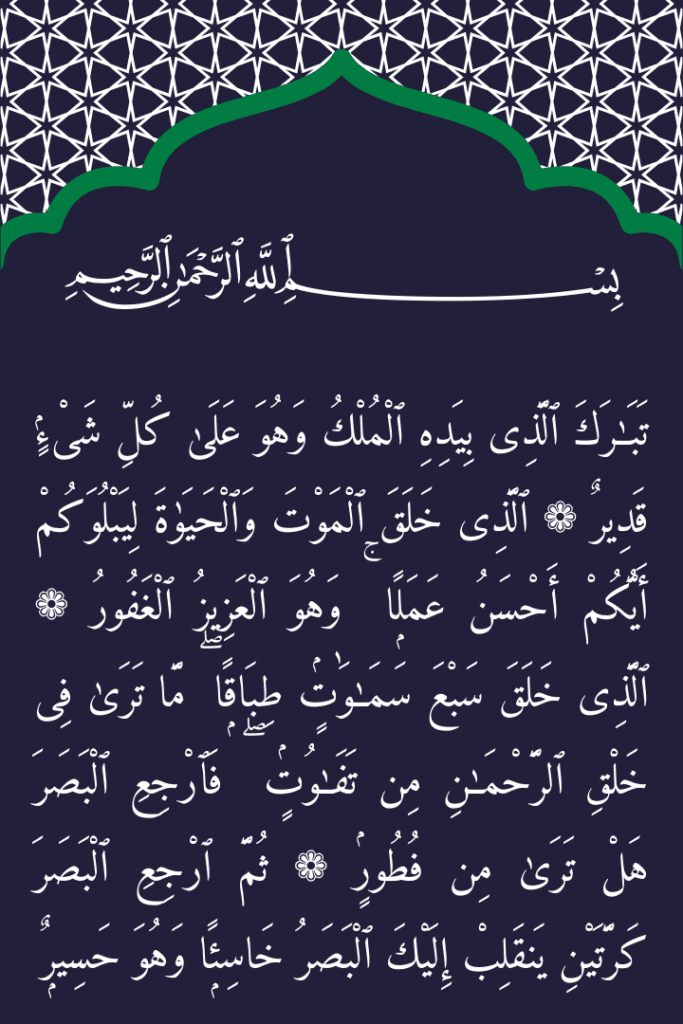
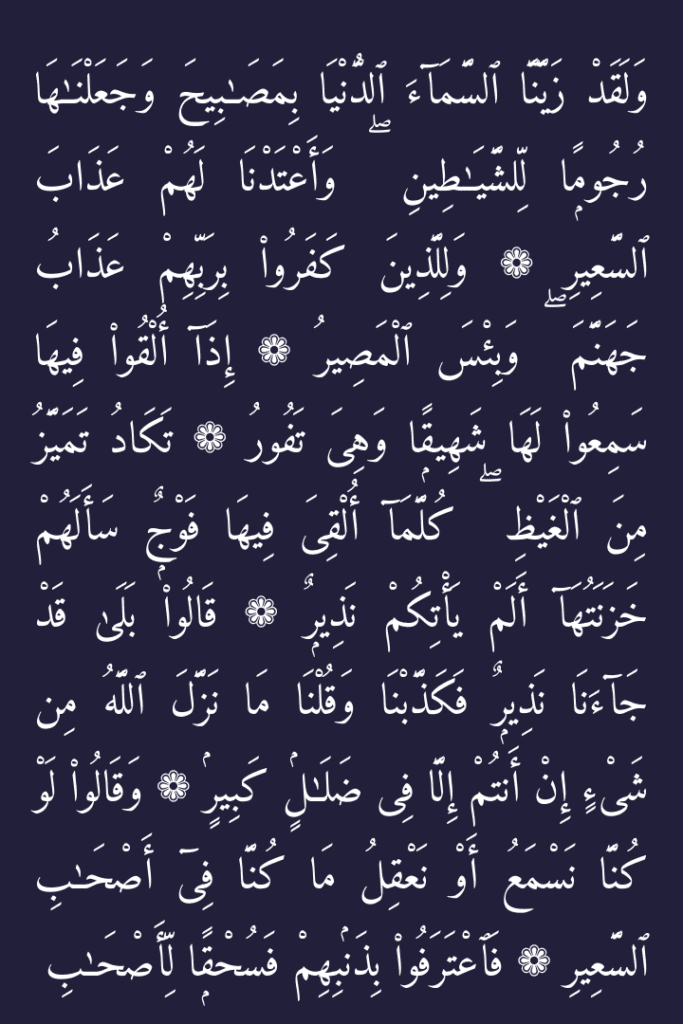
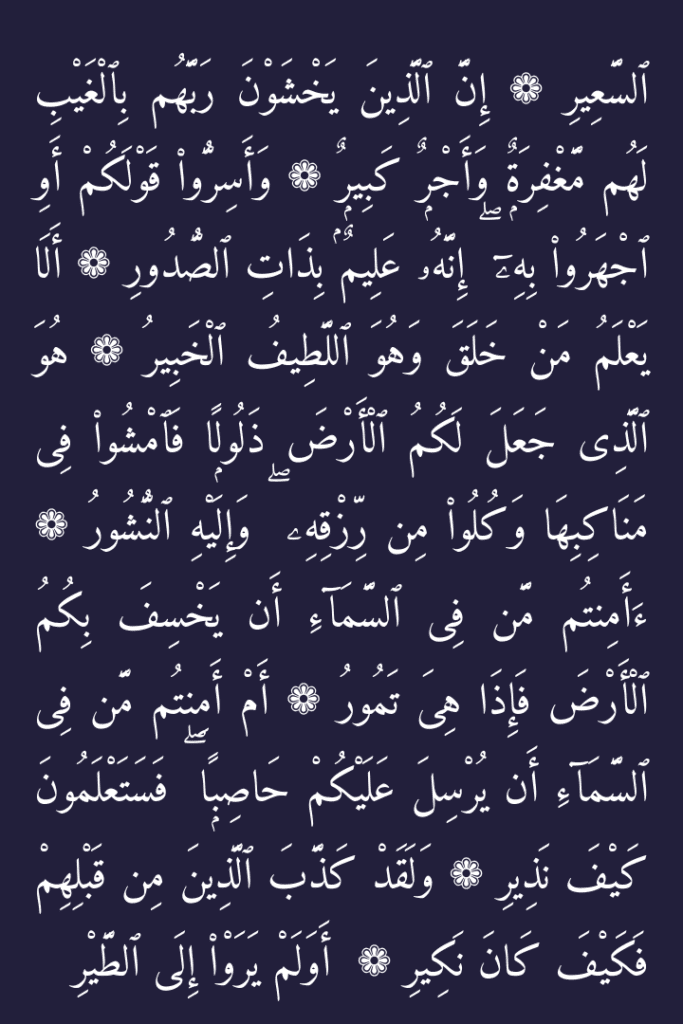
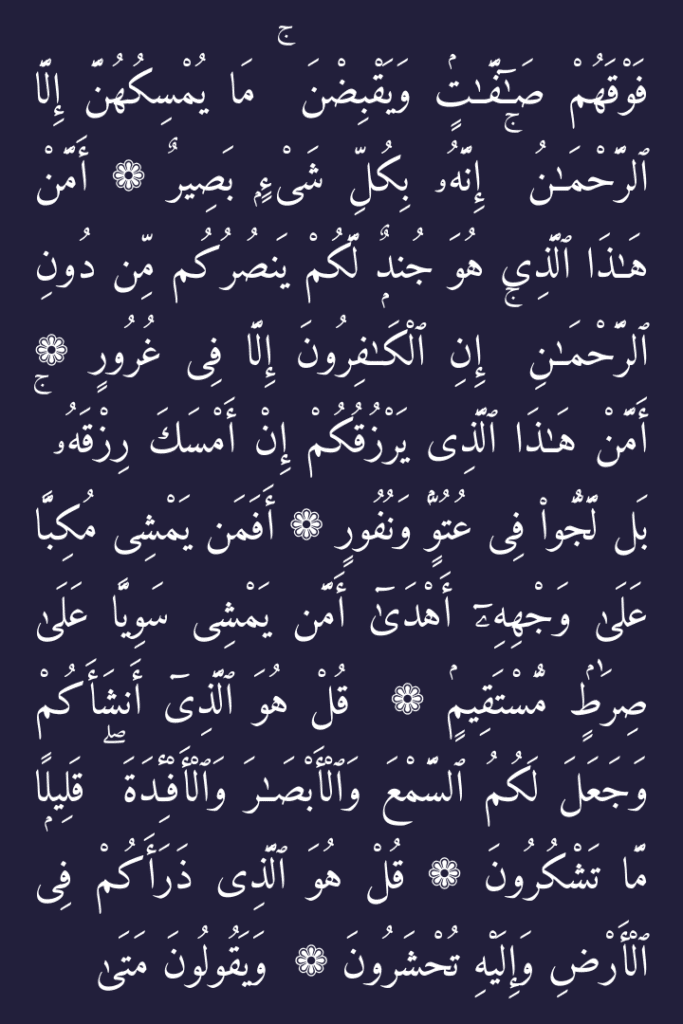
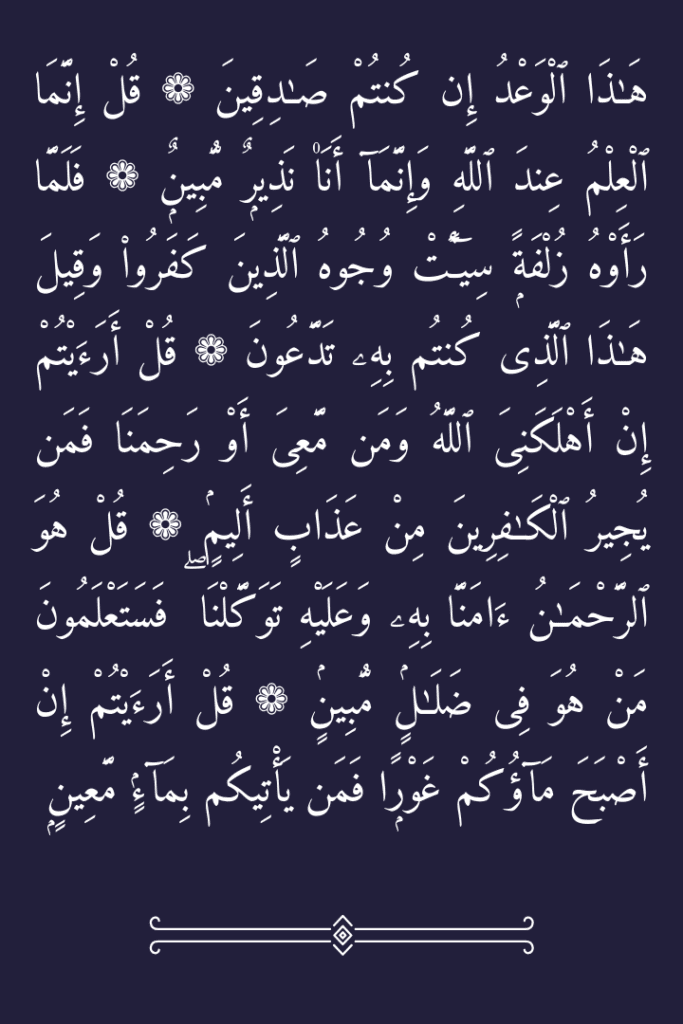
What is Surah Al Mulk?
Surah Mulk (The Chapter of Kingdom), also known as Surah e Tabarak (Chapter of Intense Blessing), is a Makki Surah and an important part of the 29th Juz of the Quran. Sura Mulk is the first chapter in the last part of the Quran because it talks about a very strong topic of the Qur’an , (the Day of Judgement). The theme of this surah is:
“No individual can impose his will on another and Allah Almighty is the master of the whole universe, and He has control over everything.”
Read the throne verse of Quran, Ayatul Kursi.
Can you imagine only 30 verses continuously asking Allah Almighty for forgiveness until He forgives? That’s why this chapter is called Surah Tabarak. Surah Tabarak is a very blessed chapter in the Quran because it teaches us to seek Allah’s forgiveness by showing His power and greatness over everything. If you want to read a surah that creates a feeling of deep respect and awe for Allah in the heart of a believer on the Day of Judgment, then Surah Al Mulk does this. It highlights the immense power, authority, and might of Allah in the heart of a believer.
When was Surah Mulk Revealed?
Surah Mulk is one of the Makkan Surahs, meaning it was revealed in Mecca before the Prophet Muhammad’s migration. Interestingly, although it’s placed as the 67th chapter in the Quran, scholars believe this surah was actually the 76th chapter revealed to the Prophet Muhammad. The scholar Ibn Ashur places its revelation between Surah al-Mu’minun (chapter 23) and Surah al-Haqqah (chapter 69).
| Surah Name | Surah Al-Mulk |
| Other Name | Surah Tabarak |
| Arabic Name | سورة الملك |
| Chapter Number | 67th |
| Para Location | 29th |
| Core Meaning | Kingdom Of Allah |
| Number of Ayahs | 30 Ayah |
| Total Words | 337 Words |
| Place of Revelation | Makkah |
| Number of Rukūs | 2 (Ayat 14 to 30) |
| Number of Manzil | 7 Manzil |
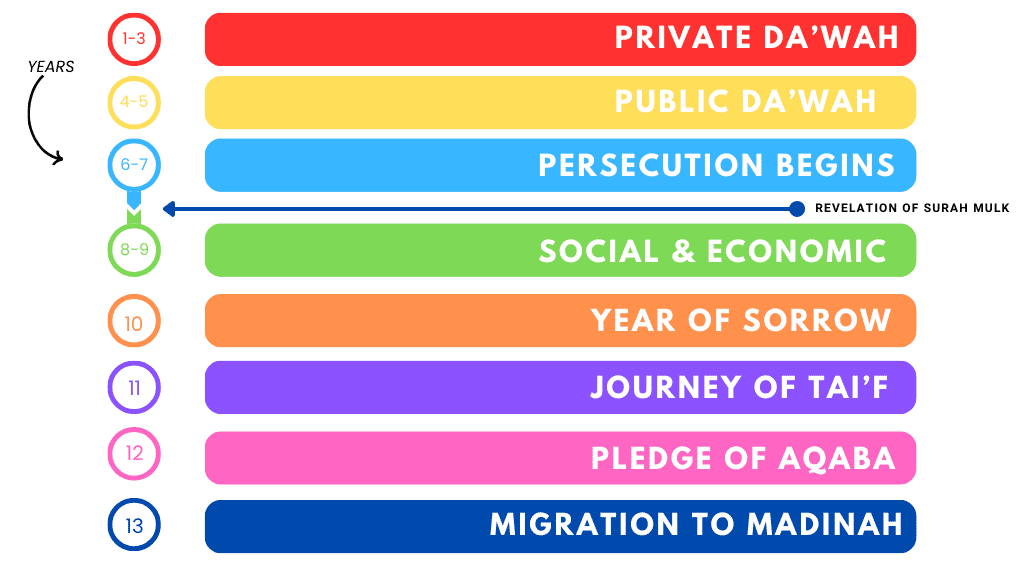
You can also read surah mulk in roman english.
Read Surah e Mulk Message
Surah e Mulk starts with glorifying Allah Almighty: “In the name of Allah, the most compassionate, the most merciful.” In the first verse Allah says,
تَبٰرَكَ الَّذِیْ بِیَدِهِ الْمُلْكُ٘- وَهُوَعَلٰى كُلِّ شَیْءٍ قَدِیْرُ,
which translates to “Blessed is he in whose hand is dominion, and he is over all thing competent.”
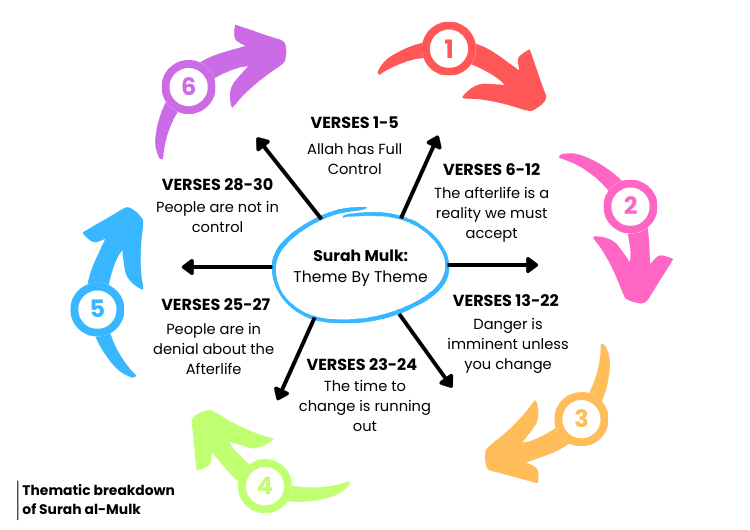
This first verse describes Allah’s absolute power and control over everything. It highlights that all blessings and mercy originate from Allah. He is the sole owner and has dominion over the entire universe. He control everything within it. His command is such that when He wills something to be, it simply is. He is the Lord who deserves to be worshipped.
In the next few verses, Surah Al Mulk speaks about Allah’s greatness, His blessings, and His creations. It describes how Allah has created the sky with amazing glory and incredible greatness, using it as an example of the perfection of His creation. This perfection extends to all His names and characteristics, as He is “As-Salam,” meaning He is perfect in every single aspect. His words and actions are perfect, which is why there is no flaw in anything Allah does.
Here is the text of Surah Mulk in Urdu translation.
Then, the Surah transitions to the consequences for those who disbelieve, describing what will happen as people are cast into Hell (Jahannam). There will be a conversation between them and the keepers (Khazana) and the nineteen angels in charge of Hell, as well as a being named SUHQ who will also speak to them. Allah vividly describes this interaction, making it feel almost real.
Moving to the second page of Surah e Mulk, Allah questions whether people believe in these warnings and reminds them that they will be taken into account. He discusses the greatness of His signs and how many times He has provided for humanity. Allah mentions the earth that He has spread out and the water He has given for drinking, emphasizing how essential water is for life. He poses the question: if Allah withholds water, who else can restore it?
This illustrates Allah’s magnificent power. The Surah reminds us that all people are sinners, but the best of sinners are those who repent. Both Paradise (Jannah) and Hell (Jahannam) were created for sinners. Allah warns His servants about His power, asking if they have any guarantee against earthquakes, the earth trembling, or sudden death. No one has such guarantees against Allah’s decree except those who disbelieve. Allah further explain His role as the provider, pointing out that He provides for the birds, and questions who else could provide if He withholds His provision (Rizq).
Finally, in the last part of this Surah, Allah talks about the Day of Judgment and life after death. The Surah also mentions that Allah created death and life to test which of us is best in deed. This process involves being dead before entering this world, being brought to life, then experiencing death again, followed by resurrection for the Day of Judgment, leading to an unlimited life in either Hellfire or Paradise, depending on the choices made in this life.
If you want Protection and Blessings, read surah yaseen.
The choice is between following the guidance of the prophets and Islam or following personal desires. Ultimately, everyone will be resurrected and held accountable for their actions.
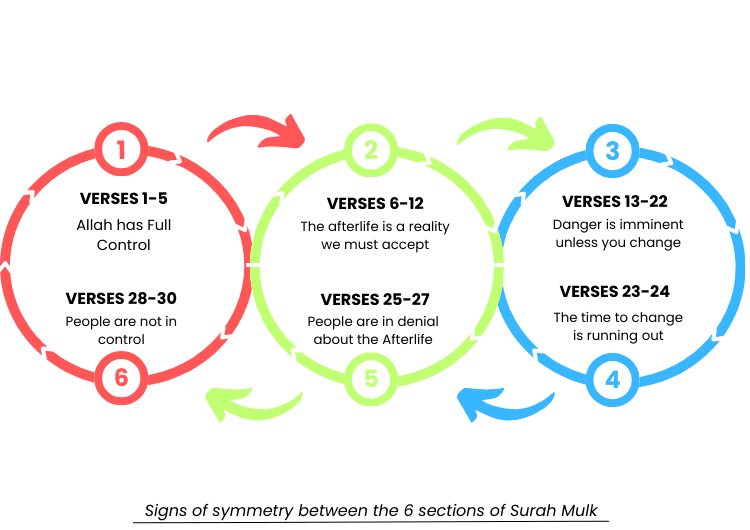
Benefits of Reading Surah Mulk
Protection from Grave Punishment:
Prophet Muhammad (SAW) said: “Recite Surah Al Mulk every night, because it is a protection from the punishment of the grave.” and also said: Al Mulk will come on the Day of Judgment with a shape like a shade and will say, ‘O Lord! I prevented my reciter from disobeying You in the world, so accept my intercession for him today.’”
Ibn Abbas said that a friend of Prophet Muhammad (saw) told a story: “One of the Prophet’s friends put a tent over a grave without knowing it was a grave. Suddenly, they heard the Surah Al Mulk being read from inside the grave until the whole chapter was done.
The friend went to the Prophet (peace and blessings be upon him) and said, ‘Messenger of Allah! I put a tent over a grave without knowing, and then I heard Surah e Mulk being read from the grave.’ The Prophet (peace be upon him) said, ‘Yes, it is al-Manicah (the Defender); yes, it is al-Munjiyah (the Rescuer), and it saves the person from the punishment of the grave.’”
If you wan to understand the fundamental pillars of Islamic faith, read 6 Kalimas.
Advocacy on Judgement Day:
This Surah is also known as “Al-Munjiyah” (the Rescuer). On Judgment Day, it will plead for mercy on behalf of those who recited it regularly. Prophet (saw) said: Surah e Mulk will argue on behalf of its reciter on the Day of Judgment saying, ‘O Lord! If I am in his book of deeds, do not part from him until You enter him (Reciter, Believer) into Jannah.’” Prophet Muhammad said an authentic hadiths: “There is a surah in the Quran which pleads for its reciter until it causes him to enter Jannah.”
If you want to protect yourself from evil eyes, read 4 Qul.
Daily Forgiveness and Blessings:
Whoever recites this Surah every night, Allah will protect him from the punishment of the grave and it will intercede for them. (Al-Hakim). Each verse of this surat erases sins and multiplies unlimited blessings. Recite it after esha or before going to sleep. An authentic hadith is, the Prophet Muhammad ﷺ would not sleep until he had recited Surat As-Sajdah and Surat Mulk. Prophet (saw) also said: Whoever recites Surah Tabarak every night will have the reward of standing in prayer all night.
Read surah muzzamil and make your spiritual connection strong.
Strengthens Your faith:
This surah reminds us that Allah Almighty controls the entire universe—the heavens, the earth, and every living creature. Reciting it fosters our taqwa and removes all the doubt. It explains that Allah created life and death to test us and see who faces life’s challenges while keeping their faith and belief strong. A person’s tests depend on their level of faith. If their faith is strong, their challenges will be greater.
Also read when you Meeting Allah in Jannah.
It’s Warn You Against Disbelief:
Surah Tabarak strongly warns those who reject Allah’s signs, stating: “They will say, If only we had listened or reasoned, we would not be among the people of the Hell!” So, it’s a wake-up call for all of us that this world is temporary; the real and everlasting world is Jannah. So, it’s up to you which path you choose—the path of Allah, the path of prophets, or simply the path of disbelievers. What guarantee was there for the disbelievers to be saved on the day of judgment? The only way anyone stands a chance in Allah’s count is if they seek his pardon and are granted ‘Maghfirah’ (forgiveness) through his rahma (mercy).
How you can choose good and bad deeds?
Fullfill Your Needs (Rizq):
According to Islamic scholars, if a person reads this powerful surah with a pure heart and makes dua, Allah will fulfill all the needs of this person. Any problem, may it be for rizq, problem facing in Marraige, problem getting a dream job, any problem they are facing, Allah will help him. That’s why Prophet (saw) said, “I wish that Surah Al Mulk be in the heart of every believer.”
If you want to increase your Rizq, read surah waqiah after magrib prayer.
Peaceful Passing:
It is said that if a person reads this surah regularly at night, when the time of death comes close, Allah makes their passing easier and less painful death. That is why the Prophet of Allah (saw) said, “There is a surah in the Quran of thirty verses, which intercedes for a believer until he is forgiven. It is Surah Tabarak Alladhi Biyadihil Mulk.”
Unlimited Rewards:
To know the importance of this nighty surah, the Prophet of Allah (saw) said: Whoever recites Surah Al Mulk is as if he has recited one-third of the Quran. You know that if a person reads only one word of the Quran, he will get tenfold blessings and rewards. This shows the importance and mightyness of this Surah.
Also read darood Akbar, because it contain all the names of Prophet Muhammad (saw).
What is the best time to recite Al Mulk Surah?
Surah Mulk is the most beloved and easy-to-read chapter in the Quran. There is no best time to read this surah; you can read this surah at any time. There are some special times where you can read this surah and get maximum blessings and rewards:
After Isha Prayer:
This surah, also known as the “Protector,” protects the one, who reads it regularly before going to sleep. This means that if a person reads this chapter after the night prayer (isha prayer) and before going to sleep, during the latter part of the night, they will receive this protection. An authentic hadith is that the Prophet Muhammad ﷺ would not sleep until he had recited Surat As-Sajdah and Al Mulk. This shows that the most beneficial time to recite this chapter is before going to bed for sleep.
After Zuhr Prayer:
It is said that if a person reads this surah after Zuhr prayer for 11 days consistently for the people that pass away, Allah Almighty will forgive them. So make a consistent habit to read this chapter every night and make duas for your loved ones.
Before going to Sleep:
Reading Surah Mulk before going to sleep brings you peace, comfort, and the reward of standing in prayer all night. 30 verses of this surah will remove the stress of your mind, tiredness of the day, life problems, and negative thinking, and it will help you overcone on your nufs. It is also a sunnah practice.
Surah Mulk On Friday:
Friday is the most beloved day in Islamic religion. Friday is also said to be the king day of the week. Muslims worldwide celebrate this day with Jummah prayer and special worship. Reading Surah a Mulk after the jummah prayer and Friday night is the source of unlimited blessings and rewards from Allah Almighty.
Read Darood Ibrahimi on friday.
During Ramadan ul Mubarak:
Ramazan a holy month in Islam. Ramzan is also known as the king month. Recitation of Surah Mulk in Ramazan brings blessings, many rewards, and Allah’s mercy. Many Muslims around the world read this blessed chapter to earn maximum sawab and make their fasting more spiritually fulfilling.
On Tahajjud Time:
Tahajjud, also known as “Nighty Prayer.” Reading this nighty surah after tahajjud prayer builds a strong spiritual connection, makes your soul stronger, brings you closer to Allah Almighty, and trains you to do good deeds.
Learn, how to make Dua? read this post.
During Hard Time:
Allah Almighty said: A person’s tests depend on their level of faith. If their faith is strong, their hard times will be greater. Reciting Surah Mulk during hard times brings mental peace, spiritual growth, removes anxiety, and helps you to face these hard challenges. That’s why Islamic scholars say to recite Quranic surah during hardships and troubles to seek Allah’s mercy, protection and forgiveness. The Prophet Muhammad ﷺ said, “Whoever recites Surah a Mulk before sleeping, Allah will send an angel to protect him until he wakes up.”
If you are facing hard time, read Dua-e-qunoot.
How many times should I recite Surah Mulk a day?
Reciting Surah e Mulk offers many blessings, rewards, and protection from grave punishment. There are no exact times; you can read it 2 times, 3 times, whatever times you like, but read it with a pure heart. It is also said that if a person reads this mighty surah after Zuhe prayer for 11 days for their family member that passes away, Allah Almighty will forgive him. That’s why Prophet of Allah (saw) said: “There is a surah in the Quran which pleads for its reciter until it causes him to enter Jannah.”
Why You Should Recite Surah Mulk Every Night? View this post.
Three important lessons of Al Mulk Surah
1. The Absolute Sovereignty and Power of Allah
The first lession this surah explains that Allah has complete authority and control over everything He has created. “Blessed is the One in Whose Hands rests all authority. And He is most capable of everything.” This verse highlights that Allah is the owner of all power (Al-Mulk) and is the All-Capable (Al-Qadeer).
The Surah also describes Allah as the giver of all good things and the overseer of everything in the universe. Even the creation of seven heavens in layers without any imperfection demonstrates Allah’s flawless creation and control. This concept is further reinforced by the ending of the Surah, which questions who else could bring flowing water if Allah were to withhold it, underscoring humanity’s total dependence on Allah’s power.
2. Life as a Test to Determine the Best in Deeds:
The second lession this Surat clearly states that Allah created life and death to test which of us is best in deeds. Verse 2 states, “He is the One who created death and life in order to test which of you is best in deeds. And He is the Almighty, All-Forgiving.” Islamic scholars explain that the first verse highlights Allah’s power, and the second verse explains the purpose of this power in relation to humanity: to test them. The Arabic word for “to test you” is ibtila, suggesting that life’s tests will be thorough and ongoing, coming in both good and bad times.
The focus is on being better in deeds, which emphasizes quality, sincerity, and growth over mere quantity of actions. This test provides an opportunity for believers to improve and grow closer to Allah. The Surah contrasts the fates of those who pass this test (believers who will receive forgiveness and a mighty reward) with those who fail (disbelievers who will face the punishment of Hell).
3. Consequences of Disbelief and the Reality of the Afterlife:
Final and last lesson, this Surah serves as a warning against disbelief in Allah and His signs, vividly describing the picture of punishment awaiting disbelievers in Hell. Verse 6 states, “Those who disbelieve in their Lord will suffer the punishment of Hell. What an evil destination!” The Surah describes the roaring and blazing of Hell as the disbelievers are thrown into it, filled with fury.
The keepers of Hell will question them, “Did a warner not come to you?” to which they will confess their denial and lament their failure to listen or reason. They will confess their sins, and condemnation will follow. It will be said to them, “This is what you claimed would never come.” The Surah thus underscores the reality of the afterlife and the consequences for those who reject faith and guidance in this life.
If you want to explore more about surah al mulk, read tafseer.
FAQs
It contains 30 Ayats, which makes this surah one of the longest in Quran Kareem.
Surah e Mulk is located in Para 29 and it is the 67th chapter of the Quran.
Prophet of Allah ﷺ says, Whoever reads Tabara-kalladhi Biyadihil Mulk every night, Allah will protect him from the punishment of the grave.
This is the most powerful and mind-freshening surah in the Quran. You can recite it once a night or 100 times a night, but you must be regular.
The best to read this surah is before going to sleep.
The word mulk means “dominion” or “kingship." It refers to Allah’s absolute sovereignty and control over the entire creation.
People read Surah Al Mulk for its numerous benefits and blessings, such as protection from the punishment of the grave, intercession on the Day of Judgment, and seeking forgiveness from Allah.
If you have other questions related to this surah, you can further explore this page.
Conclusion
In conclusion, imagine just before starting this Surah, we are talking about all these beautiful meanings of it; the one who takes it to the daily routine and recites it every day every night before sleep will be protected. The grave suddenly punishes every single person, believer or not believer. Once he goes to that grave, the punishment is coming.
If he is a believer, he knows Allah Almighty, what is the way of Prophet Muhammad ﷺ, the right path? He will be protected, and the punishment goes away. But imagine the punishment is coming and angels will ask, Who is your Lord? What is your religion? How do you live your life? and he will say, I don’t know, then the punishment will intervene over him. So, we want to protect ourselves from this; we don’t want to get or go through any kind of punishment. So, the best solution and option is to follow the right path, the path that Prophet Muhammad ﷺ told us, and follow the commitment of Allah, and by that, you are protected. Reading this beloved Surah will take only 10 minutes, but the reward is big.